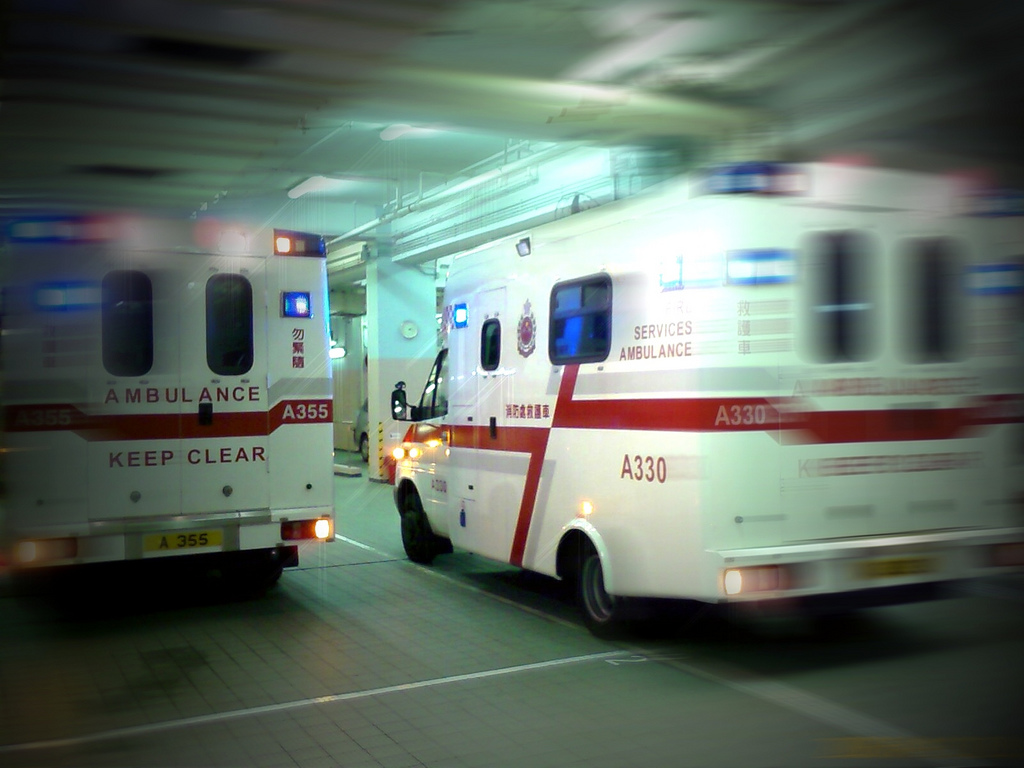What To Do After Your Motor Vehicle Accident
 Thursday, March 24, 2011 at 12:52PM
Thursday, March 24, 2011 at 12:52PM  Ambulance Returing to Hospital, Chris Wong, FlickrYou Crashed Your Motorcycle. Now What?
Ambulance Returing to Hospital, Chris Wong, FlickrYou Crashed Your Motorcycle. Now What?
All of the people you need to process the scene of your incident have arrived, you're in a lot of pain, and they all want to ask you questions and be given answers at once.
If you are lucky to have an adrenaline surge (as I did), that will help control the pain level for a few minutes at best. Start using breathing control - regular, slightly slower than normal breaths to help keep it together. Yeah, it still hurts, but there are important decisions that can't wait for answers to be dealt with right now and this will help you get through it.
Where do you want to be taken?
If you are conscious, tell the emergency personnel your wishes. Ask for their advice if you aren't familiar with the area or are not sure about the severity of your injuries. Now what about cases where you are NOT conscious or coherent?
Your wallet should have your I.D. in it, and the police and paramedics need information. Secure an old business card in your wallet where it can be easily found that has ICE wriiten on it in big letters (In Case of Emergency). Put your emergency contact person's phone number on it and your wish to be taken to a trauma center if at all possible. Remember, you're a motorcyclist: it's not a matter of IF you will crash, merely a matter of WHEN. It took me 38 years, but it happened.
What about towing the remnants of your bike/car?
Ask the police to inform you of where it is going and for them to provide a phone number and address if available. The tow truck driver can also leave a business card with you or the police. There are daily charges for impound and storage that you insurance may or may not cover fully.
Speaking of insurance...
Have your ICE person contact the insurance company if you are not in any condition to call Sooner is better than later. Once your people know you are on the way for treatment is the perfect time to call. If they have come to the scene, they can get business cards or at least phone numbers to contact all concerned parties.
Motorcycle insurance is not required in all states, but I highly recommend it none the less. Health and disability insurance are also nice to have, since the bills can easily exceed $100,000.00 for a two or three week stay in the hospital. Check your policies to see if you have personal injury protection and gap coverage if you're making payments. The bank wants their money and doesn't care if you are broken into little pieces.Check around and price shop for decent coverages, it will be worth the effort should you ever need it.
OK, now it's really starting to hurt !
When someone who has had severe pain episodes tells you that it is necessary to be ahead of the curve, listen to them. Waiting too long, until the pain become intense actually makes it a lot more difficult to get back under control. Paramedics may or may not be able to give you something for pain. If not, do you best to try to relax, breathe, and think about the most pleasant place you've ever been in your life, the most pleasant experience, etc. Take your brain away from the pain - it really can help.
Being moved around - Hey, be careful!
Broken bones hurt when they are twisted, so keep emergency responders informed about where you are injured to minimize that problem. Splints help, but aren't perfect at immobilizing limbs, especially when you are lifted and moved from gurneys and exam tables. Watch out for three person lifting teams if you weigh more than 180 lbs. as I do. A fourth person may be needed to move you carefully enough to avoid major pain.
At the hospital emergency room.
The doctors and nurses will probably come around and ask you, " On a scale of 1 to 10, 10 being the worst pain imaginable, what is your pain level right now?".
Tell them honestly where it hurts and how much pain you are feeling. Depending upon your types and levels of injury, you may not get much pain relief right away. The pain medications can have bad side effects that could interfere with treatment and your ability to breathe, so hang in there as long as you can against the throbbing. Nothing they can give you will take away all of the pain and allow you to be awake, and they have a million questions to be answered again and again. Once they get all the the answers they need, you will probably be given enough pain meds to allow you to drift off to sleep.
Staying Positive
Keeping as positive a frame of mind as you can is probably the best thing you can do to aid in your pain level control. You may not be able to walk or even get out of bed, but you can try a variety of mental routines to distract yourself from the pain. It can really work. For a few minutes, riding in the back of the fire department aid car, the small scrape on my pinkie hurt worse than the leg broken into eight pieces. I had been talking to the paramedic about my bike and had become angry again at the jerk who caused the crash. Probably not the best sort of distraction, hey, it worked!
Next up in the series - What Is a Trauma Center?
Dave from Shoreline
Reader Comments